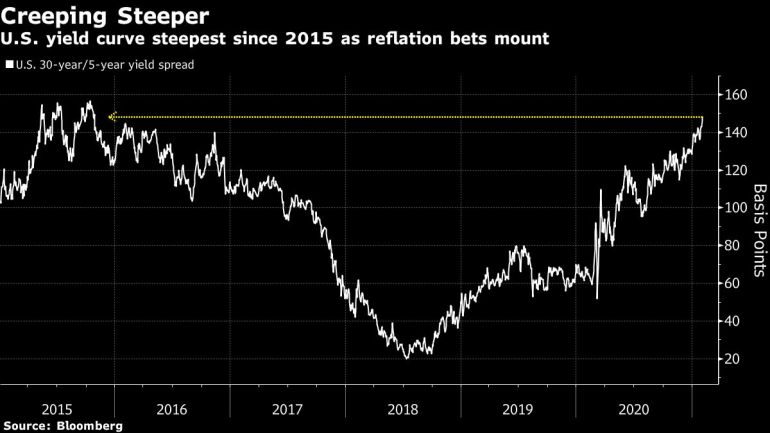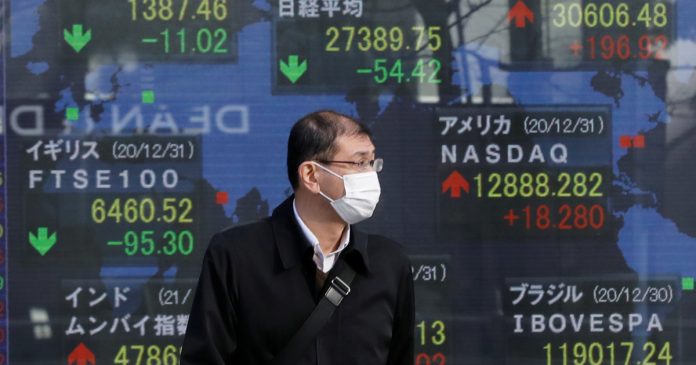[ad_1]
Global shares closed in on their record peak on Friday, with Asian shares taking their lead from Wall Street, as progress in vaccine distribution prompted bets on further normalisation in the global economy and earnings recovery.
MSCI’s gauge of Asian shares outside Japan rose 0.4 percent while Japan’s Nikkei rallied 1 percent.
Meanwhile, MSCI’s index of the world’s largest 50 markets, the MSCI ACWI, extended its gains into a fifth-straight day to come within reach of a record high it touched about two weeks ago.
On Wall Street, each of the three main indexes rose more than 1 percent on Thursday, with the Nasdaq Composite Index and S&P 500 setting record highs.
Many economists are hoping that the roll-out of vaccines globally will bring COVID-19 infections down and allow governments to open up sectors such as in-door dining, travel and entertainment that have been mostly shuttered during the pandemic.
“Last year’s economic slide – nay, ‘tumble’ – left deep scars,” Frederic Neumann, the co-head of Asian economics research at banking giant HSBC, wrote in a research note sent to Al Jazeera.
“Many lost their jobs, incomes took a hit, and profits at numerous companies got slashed. This year, the hope is that with vaccines on their way, much of this will reverse,” he said.
Neumann said households and companies have amassed “enormous” savings during the pandemic, “though not evenly distributed, unfortunately.”
Global equities are flirting with all-time highs as corporate profits rebound, central banks remain supportive amid the pandemic and as US President Joe Biden tries to fast-track a $1.9 trillion stimulus package. A report on Thursday showed US jobless claims fell to their lowest since November, and US investor focus now turns to payroll data on Friday.
US relief bill
Longer-term US Treasury bond yields rose in anticipation of the large pandemic relief bill from Washington as well as on heightening inflation expectations. Bond yields rise and their prices fall as investors move funds into riskier assets such as stocks.
The benchmark 10-year yield stood at 1.136 percent, having risen to a three-week high of 1.162 percent the previous day while the 30-year bond yielded 1.929 percent, near its 10-and-a-half-month high of 1.951 percent reached on Thursday.
 [Bloomberg]
[Bloomberg]
Bond yields rose in Europe as well, with Germany’s 30-year government bond yield climbing back in positive territory for the first time since September.
A market gauge of future US inflation was at its highest since October 2018 while that for the euro zone hit its highest since May 2019.
In the currency market, the dollar strengthened against most of its peers as traders’ focus appeared to shift to the relative strength of the US growth.
Until recent weeks, the dollar had been sold on expectations that global economic recovery will promote outflows of funds to riskier currencies from the safe-haven dollar.
‘Economic normalisation’
The US dollar index – a gauge of the dollar’s value against a basket of key global currencies – stood near a two-month high, having risen 1.1 percent so far this week, on course for its biggest weekly increase since October.
The euro changed hands at $1.1964, having hit a two-month low of $1.1955 overnight while the yen hit a three-and-a-half-month low of 105.70 per dollar.
“It seems markets are now trying to trade on economic normalisation based on progress in vaccination,” said Arihiro Nagata, the general manager of global investment at Sumitomo Mitsui Bank.
“The fact that the only currencies that are doing better than the dollar over the past two days are the British pound and the Israeli shekel, the two countries that are going further ahead in vaccination, seems to support that.”
The British pound stood at $1.3678 not far from its two-and-a-half-year peak of $1.3759 hit late last month.
Strength in the dollar pushed gold to a two-month low of $1,785.10 per ounce on Thursday. The metal was last traded at $1,797.40.
Oil prices extended their gains on the upbeat economic mood, falling inventories and the decision by the Organization of the Petroleum Exporting Countries and its allies to stick to their output cuts.
US crude rose 1 percent to $56.80 per barrel and Brent was at $59.38, up 0.9 percent.
[ad_2]
Source link











